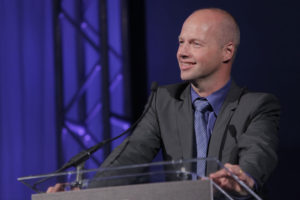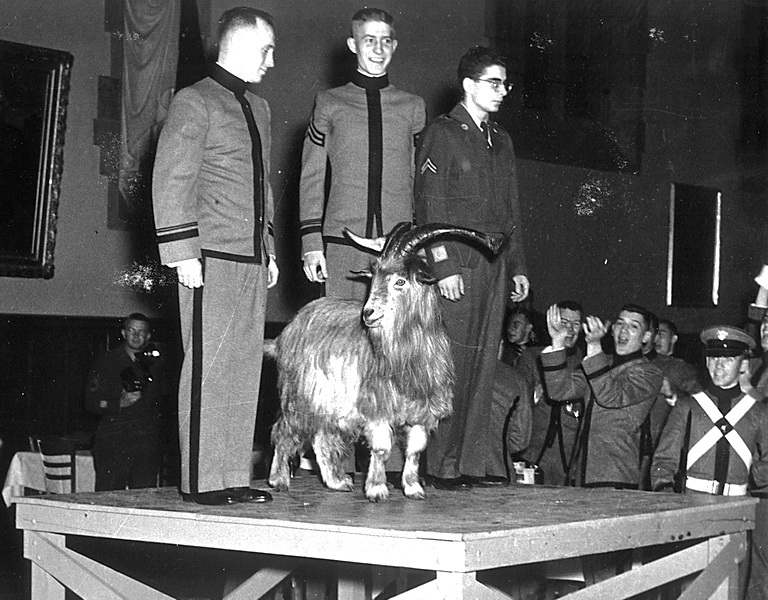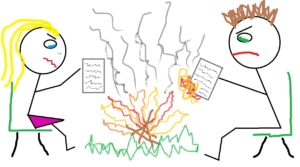
As a challenging future rushes towards us, I often wonder whether our democratic values will continue to provide a sound enough foundation for our lives and work.
In many ways, this “white-water world” is already here. As framed by John Seely Brown in a post last summer, it confronts us with knowledge that’s simply “too big to know” and a globe-spanning web of interconnections that seems to constantly alter what’s in front of us, like the shifting views of a kaleidoscope.
It’s a brave new world that:
– makes a fool out of the concept of mastery in all areas except our ability–or inability–to navigate [its] turbulent waters successfully;
– requires that we work in more playful and less pre-determined ways in an effort to keep up with the pace of change and harness it for a good purpose;
– demands workplaces where the process of learning allows the tinkerer in all of us “to feel safe” from getting it wrong until we begin to get it right;
– calls on us to treat technology as a toolbox for serving human needs as opposed to the needs of states and corporations alone; and finally,
– requires us to set aside time for reflection “outside of the flux” so that we can consider the right and wrong of where we’re headed, commit to what we value, and return to declare those values in the rough and tumble of our work tomorrow.
In the face of these demands, the most straightforward question is whether we will be able to safeguard our personal wellbeing and continue to enjoy a prosperous way of life. Unfortunately, neither of these objectives seems as readily attainable as they once did.
When our democratic values (such as freedom and championing individual rights) no longer ensure our wellbeing and prosperity, those values get questioned and eventually challenged in our politics.
Last week, I wrote here about the dangerous risks—like addiction and behavioral modification—that our kids and others confront by spending too much screen time playing on-line games like Fortnite. Despite a crescendo of anecdotal evidence about the harms to boys in particular, the freedom-loving (and endlessly distracted) West seems stymied when it comes to deciding what to do about it. On the other hand, China easily moved from identifying the harm to its collective wellbeing to implementing time restrictions on the amount of on-line play. It was the Great Firewall’s ability to intervene quickly that prompted one observer to wonder how those of us in the so-called “first world” will respond to “the spectacle of a civilisation founded [like China’s] on a very different package of values — but one that can legitimately claim to promote human flourishing more vigorously than their own”?
Meanwhile, in a Wall Street Journal essay last weekend, its authors documented the ability of authoritarian countries with capitalist economies to raise the level of prosperity enjoyed by their citizens in recent years. Not so long ago, the allure of West to the “second” and “third worlds” was that prosperity seemed to go hand-in-hand with democratic values and institutions. That conclusion is far less clear today. With rising prosperity in authoritarian nations like China and Vietnam—and the likelihood that there will soon be far more prosperous citizens in these countries than outside of them—the authors fretted that:
It isn’t clear how well democracy, without every material advantage on its side, will fare in the competition [between our very different value systems.]
With growing uncertainty about whether Western values and institutions can produce sufficient benefits for its citizens, and with “the white-water world” where we live and work challenging our navigational skills, it seems a good time to return to some questions that we’ve chewed on here before about “how we can best get ready for the challenges ahead of us.”
Can the ways that we educate our kids (and retrain ourselves) enable us to proclaim our humanity, secure our self-worth, and continue to find a valued place for ourselves in the increasingly complex world of work?
Can championing new teaching methods strengthen democratic values and deliver more of their promise to us in terms of wellbeing and prosperity than it seems we can count on today?
Are new and different classrooms the keys to our futures?
1. You Treasure What You Measure
Until this week, I never considered that widely administered education tests would provide any of these answers—but I probably should have—because in a very real way, we treasure the aptitudes and skills, indeed everything that we take the time to measure. Gross national product, budget and trade deficits, unemployment rates, the 1% versus everyone else: what is most important to us is endlessly calculated, publicized and analyzed. We also value these measures because they help us decide what to do next, like stimulating the economy, cutting government programs, or implementing trade restrictions. Measures influence actions.
It’s much the same with the measures we obtain from the educational tests that we administer, and in this regard, no test today is more influential than the Programme for International Student Assessment or PISA. PISA was first given in 2000 in 32 countries, the first time that national education systems were evaluated and could be compared with one another. The test measured 15-year-olds scholastic performance in mathematics, science and reading. No doubt you’ve heard some of the results, including the United States’ disappointing placement in the middle of the international pack. The test is given every three years and in 2018, 79 countries and economies participated in the testing and data collection.
According to an article in on-line business journal Quartz this week, “the results…are studied by educators the way soccer fans obsess over the World Cup draw.”
No one thinks more about the power of the PISA test, the information that it generates, and what additional feats it might accomplish than Andreas Schleicher, a German data scientist who heads the education division of the Organisation for Economic Cooperation and Development (OECD) which administers PISA worldwide.

Schleicher downplays the role that the PISA has played in shaming low performing countries, preferring the test’s role in mobilizing national leaders to care as much about teaching and learning as they do about economic measures like unemployment rates and workplace productivity. At the most basic level, PISA data has supported a range of conclusions, including that class size seems largely irrelevant to the learning experience and that what matters most in the classroom is “the quality of teachers, who need to be intellectually challenged, trusted, and have room for professional growth.”
Schleicher also views the PISA as a tool for liberating the world’s educational systems from their single-minded focus on subjects like science, reading and math and towards the kinds of “complex, interdisciplinary skills and mindsets” that are necessary for success in the future of work. We are afraid that human jobs will be automated but we are still teaching people to think like machines. “What we know is that the kinds of things that are easy to teach, and maybe easy to test, are precisely the kinds of things that are easy to digitize and to automate,” Schleicher says.
To help steer global education out of this rut, he has pushed for the design and administration of new, optional tests that complement the PISA. Change the parameters of the test, change the skills that are measured, and maybe the world’s education-based priorities will change too. Says Schleicher: “[t]he advent of AI [or artificial intelligence] should push us to think harder [about] what makes us human” and lead us to teach to those qualities, adding that if we are not careful, the world’s nations will be continue to educate “second-class robots and not first-class humans.”
Schleicher had this future-oriented focus years before the PISA was initially administered.
In 1997, Schleicher convened a group of representatives from OECD countries, not to discuss what could be tested, but what should be tested. The idea was to move beyond thinking about education as the driver of purely economic outcomes. In addition to wanting a country’s education system to provide a ready workforce, they also wondered whether they could nurture young people to help to make their societies more cohesive and democratic while reducing unfairness and inequality. According to Quartz:
The group identified three areas to explore: relational, or how we get along with others; self, how we regulate our emotions and motivate ourselves, and content, what schools need to teach.
Instead of simply enabling students to respond to the demands of a challenging world, Schleicher and others in his group wanted national testing to encourage the kinds of skill building that would enable young people to change the world they’d be entering for the better.
Towards this end, Schleicher’s team began to develop assessments for independent thinking and the kinds of personal skills that contribute to it. The technology around test administration enabled the testers to see how students solved problems in real time, not simply whether they get them right or wrong. They gathered and shared data that enabled national education systems to “help students learn better and teachers teach better and schools to become more effective.” Assessments of the skill sets around independent thinking encouraged countries to begin to see new possibilities and want to change how students learn in their classrooms. “If you don’t have a north star [like this], perhaps you limit your vision,” he says.
For the past twenty years, Schleicher’s north stars have also included students’ quest to find meaning in what they are doing and to exercise their agency in determining what and how they learn. He is convinced that people have the “capacity to imagine and build things of intrinsic positive worth.” We have skills that robots cannot replace, like managing between black and white, integrating knowledge, and applying knowledge in unique situations. All of those skills can be tested (and encouraged), along with the skill that is most unique about human beings, namely:
our capacity to take responsibility, to mobilize our cognitive and social and emotional resources to do something that is of benefit to society.
What Schleicher and his testing visionaries began to imagine in 1997 have been gradually introduced as optional tests that focus on problem-solving, collaborative problem-solving, and most recently, so-called “global competencies” like open-mindedness and the desire to improve the world. In 2021, another optional test will assess flexibility in thinking and habits of creativity, like being inquisitive and persistent.
One knowledgeable observer of these initiatives, Douglas Archibald, credits Schleicher with “dramatically elevating” the discussion about the future of education. “There is no one else bringing together people in charge of these educational systems to seriously think about how their systems [can be] future proofed,” says Archibald. But he and others also see a hard road ahead for Schleicher, with plenty of resistance from within the global education community.
Some claim that he is asking more from a test than he should. Others claim his emphasis is fostering an over-reliance on testing over other priorities. Regarding the “global competencies” assessment for example, 40 of the 79 participating countries opted not to administer it. But Schleicher, much like visionaries in other fields, remains undaunted. Nearly half of the countries are exercising their option to assess “global competencies” and even more are administering the other optional tests that Schleicher has helped develop. Maybe educators are slowly becoming convinced that the threat to human work in a white-water world is too serious to be ignored any longer.

While Schleicher and his allies are in the vanguard of those who are using a test to prompt a revolution in education, they are hardly the only ones to challenge a teaching model that, for far too long, has only sought to produce a dependable, efficient and easily replaceable workforce. The slide above is from Sir Kenneth Robinson’s much-heralded (and well-worth your taking a look at) 2010 video called “Changing Education Paradigms.” In it, he also champions teaching that enables uniquely human contributions that no machine can ever replace.
Schleicher, Robinson and others envision education systems that prepare young people (or re-engineer older ones) for a complex and ever shifting world where no one has to be overwhelmed by the glut of information or the dynamics of shifting networks but can learn how to navigate today’s challenges productively. They highlight and, by doing so, champion teaching methods that help to prepare all of us for jobs that provide meaning and a sense of wellbeing while amplifying and valuing our uniquely human contributions.
Schleicher is also helping to modify our behavior by championing skills like curiosity about others and empathy that can make us more engaged members of our communities and commit us to improving them. Assessing these skills in national education tests says both loudly and clearly that these skills are important for human flourishing too. Indeed, this may be Schleicher’s and OECD’s most significant contribution. Their international testing is encouraging the skills and changes in behavior that can build better societies, whether they are based on the democratic values of the West or the more collective and less individual ones of the East.
That is no small thing. No small thing at all.
This post is adapted from my March 10, 2019 newsletter.




